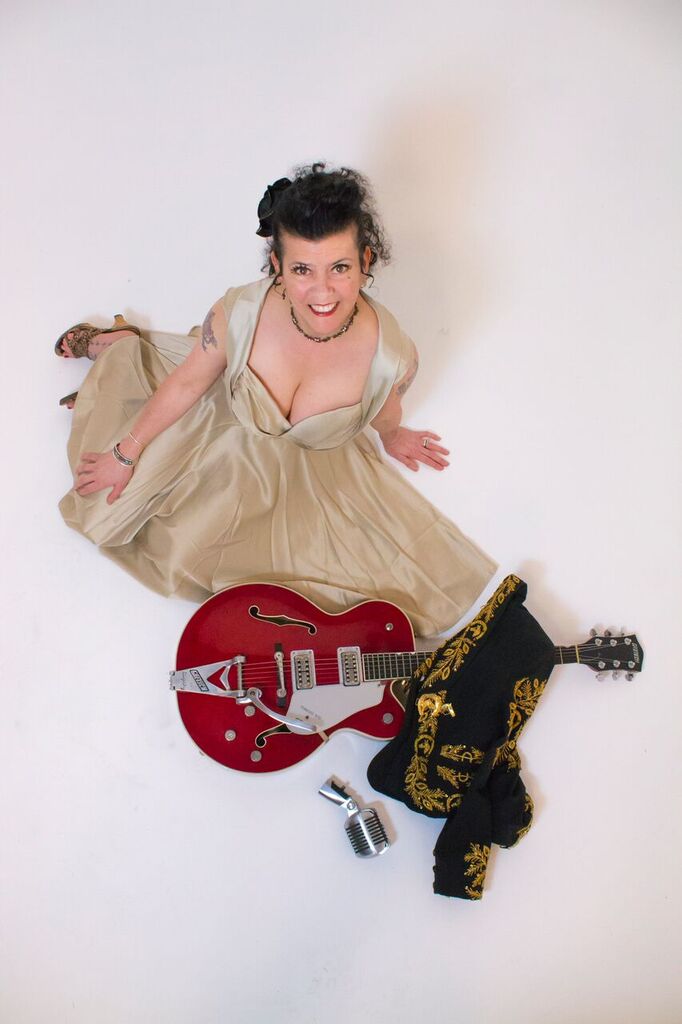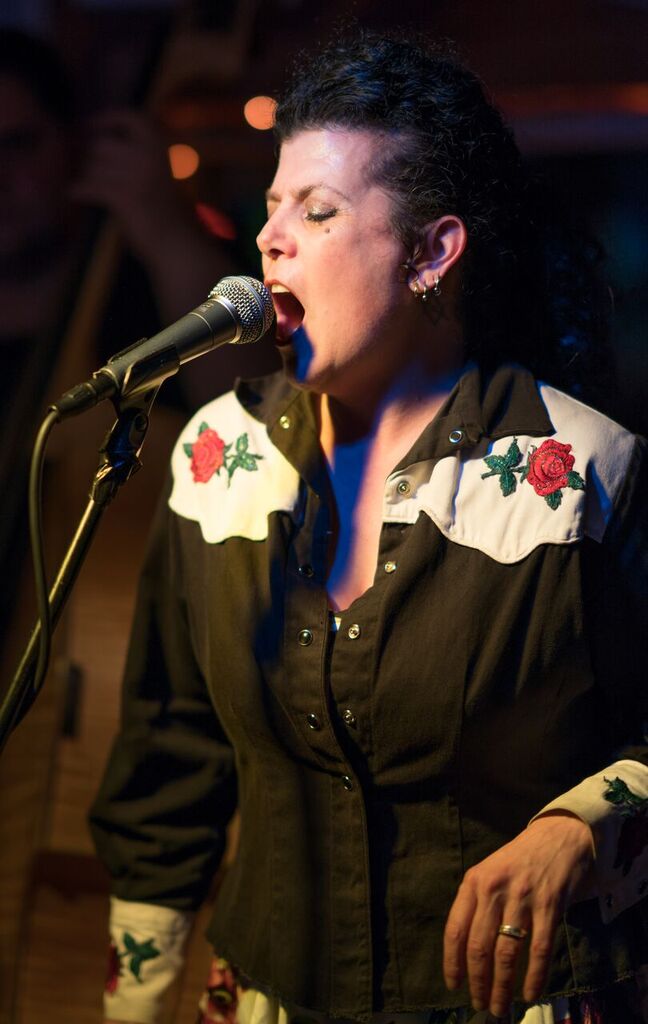 By Jim Hynes
By Jim Hynes
Ruby Dee, the frontwoman for Ruby Dee & the Snakehandlers, suffered a devastating- though relatively undetectable- head injury eight years ago. Now, with her latest album, Little Black Heart, released in July, she’s back in the driver’s seat. Ruby wrote all but one song on the record, and continues to receive accolades for the ferocious blend of honky-tonk, rockabilly, Western swing and rock ‘n’ roll. We chatted with the artist about mounting a remarkable comeback and finding her way back into the spotlight.
Elmore Magazine: So, Little Black Heart was released in July. How long was it between albums?
Ruby Dee: We did a kids album in 2013, which was not really a new album, but I rewrote the lyrics to be geared to kids. We put a live album out in 2011, but this was really the first complete new effort since 2008.
EM: How do you feel about how the album has been received?
RD: We’re thrilled. We have several nominations both for Song of the Year and Album of the Year. Okay, I want to emphasize that this is the first stage of both the Grammys and the Ameripolitan Awards. We’ve been nominated for inclusion on the ballot for both; it’s what’s called the primary ballot. Here are the various standings as of now:
Roots Music Report – album #3 on the Rockabilly Chart Top 50 albums
Roots Music Report – “Not For Long” song #2 on the Rockabilly Chart Top 50 songs
Ameripolitan Music Awards – Best Rockabilly Female Singer, Best Rockabilly Band
GRAMMY categories – Album of the Year, Record of the Year, Song of the Year (“Not For Long”), Best Americana Album, Best American Roots Song (“Not For Long”), Best American Roots Song (“Put You Down”), Best American Roots Song (“You Underwhelm Me”)
EM: So can you talk a bit about what to you that makes this album so special?
RD: Eight years ago, I was in a pretty bad accident that left me with a moderately severe TBI (Traumatic Brain Injury). In the first months after the accident, I couldn’t really speak clearly, let alone write or read. I had vertigo, and couldn’t remember a damned thing from one moment to the next. I’ve always prided myself on brains rather than looks, so this accident was completely devastating.
EM: What other problems were caused by the accident?
RD: Another side effect of the head injury was that I couldn’t even remember friends’ names or faces, and often walked right past folks I knew, especially if I saw them out of context- at the grocery store rather than the club, for instance. I was also easily confused and distracted, so if you can imagine being at a show with all the noise and lights and people moving around- I was a wreck after even just a few minutes in a venue. I started isolating- even at shows- because it was all too much for me to handle. My brain would just shut down, and it was all I could do to get up on stage and perform.
EM: What were your bandmates doing in the interim?
RD: Well, we never really stopped performing. My doctors told me music was good for the brain, so they advised me to keep going. It was difficult; I had to sit in chair or hold on to something. I would forget lyrics and needed help with that too. Flashing lights and noises often distracted me. We had to stop touring because I had vertigo. After the show was over, I had to get off by myself. I didn’t hang out and talk to people.
EM: How did it feel to go out and perform at the CD release parties and shows since?
RD: It’s become better incrementally. I don’t have the vertigo anymore and am not as easily distracted, but those symptoms still occur if I tour too often or at the end of the tour. I am slightly more present and able to better connect with the audience.
EM: What else changed?
RD: People who knew me from before started getting angry with me- as though I was ignoring them on purpose and just being nasty. Someone would ask me a question and I would get overwhelmed and walk away. Not on purpose- something in my brain would just short circuit and that would be my reaction, though I wouldn’t remember it if you asked me later. I tried to explain what it’s like with a head injury, but honestly, no one seemed to want to hear it. I looked fine- the scars are for the most part all on the inside of my brain- so folks just thought I was being a bitch. I lost a handful of friends, and who knows how many fans or other people just assumed I was being rude.
EM: Stepping back a bit, let’s talk about your career prior to the injury. You had successfully owned and operated three restaurants in Seattle, right? And, on top of that you and your band were huge fan favorites. How did you juggle all of that?
RD: I got burned out on restaurants. I had over 100 employees, and wanted to make sure that they were well taken care of with health insurance and benefits. It started to become too much, so I decided to focus on music. The City of Seattle started a construction project that closed one of my restaurants, and that helped me make my decision.
EM: You reside in Austin now, right?
RD: Yes, my family is from Texas, and we had bought a house here even prior to the accident. Certainly it made sense to be near my family and friends after the accident. Also, it made a lot more sense musically. We had to go Portland, Oregon on the weekends just to find a compatible rhythm section with a stand-up bass. Here, rockabilly is much more widespread.
EM: So what steps did you take to recover?
RD: I tried to get help because I became severely depressed and suicidal. My family didn’t even know how bad the head injury was, as I’d always been the type to crow about successes but not complain about hurts. And because there had been no actual impact between the other vehicle and my scooter- they’d run me off the road- I got no help from insurance. They paid for ONE cognitive therapy appointment and then said it wasn’t working. However, that one appointment gave me so much to work with. The doctor had given me a booklet of word exercises and word games, and once I saw how that type of work seemed to help, I threw myself into it with everything I had. I started buying puzzle books and word games just to remember words. I started writing stories and vignettes, and it would take me all day to write a few paragraphs. And sometimes I couldn’t remember words and I’d cheat just to finish.
 EM: Those were the initial stages. How did you get to the point where you were able to write a cookbook?
EM: Those were the initial stages. How did you get to the point where you were able to write a cookbook?
RD: Four years after the accident, I was able to write and read more easily- but not songs- just words, stories, even recipes. One thing I knew I could do from my background was to write recipes. You can’t cheat when you’re doing that, but it would still take me a day to write one out. After a year of doing this I realized I had a cookbook [Ruby’s Juke Joint Americana Cookbook]. Eventually I found a good publisher and that led to lots of interviews. Then I was asked to do a cooking radio show [Ruby’s Kitchen Radio Show] that I had to write episodes for on a weekly basis for a few years. That was the best therapy, because I had to write scripts for this 15 minute show, which was widely heard on 900 stations all over the world. The episodes are still available on podcasts. And suddenly one day, I heard the old familiar feeling of tune and lyrics coming together in my head, and started working on songs again.
EM: What is like writing a song now compared to before?
RD: It’s different. Songs used to just come to me when walking or driving. Now I have to sit down and put a lot of sweat and toil into it. It takes so much more out of me now. I have to work so much harder to write a song than I used to. But I think the songs are better for it. I appreciate the song more now than before.
EM: You have a song on the album dealing with this experience, right?
RD: So! “Who You Think I Am” is about having this head injury- how it’s hidden, and because you don’t see it, you don’t realize how it can affect me. There’s pretty much a hole in my head, and I still suffer from it every day, though I would never let you see that. But I still get overwhelmed and easily confused and distracted. When I am tired, I forget words and names and even friends’ faces. I’m about as good as I’m ever going to be, and I’m grateful for what I’ve been able to retrain my brain to be able to do- reading and writing and speaking clearly again. But I’m never going to be 100%, and I’m always going to have these glitches where I walk past folks, or am so overwhelmed that my brain sort of shuts down.
EM: Go ahead. Elaborate a bit more on the song.
RD: The lyrics of “Who You Think I Am” are telling you what it’s like living with this every day. I didn’t do the thing you think I did on purpose. I try so hard, and do what I can to show up and get things done. But there’s a dead zone inside of me, and I can’t help how it shows up nor how it affects folks around me. When all is said and done, if you don’t look beyond the outer shell to the injury inside, then you won’t see what’s going on. I’m not who you think I am. That’s the song.
EM: What advice would you have for someone who goes through this kind of injury?
RD: Ask for help. Don’t be afraid to let people know what’s going on. It’s a hidden injury. Now is the first time after eight years that I’ve really started to talk about it. I know I’ve lost fans and friends. People with these kinds of injuries need to find support groups, and I’m fortunate that they have those groups here in Austin. They also have a closed Facebook group where you can share experiences and emotions. It’s important to have trusted friends. Thank God for Jorge who stuck with me through it all. You know, I actually have a plea- if you know anyone with a head injury or aneurysm or anything that affects the brain, be kind to them. Reach out a little to them, because it’s hard being trapped inside with this sort of injury. No one can really see it from the outside, and we are treated accordingly. A broken arm? Oh, let me carry that for you. Blind? Let me help you across the street. But a head injury? Out of sight, really and truly out of mind. And when all is said and done, all you can do is to keep on rolling- so that’s what I do!
EM: You are a remarkably strong person. We wish you the best and know that your story will be an inspiration for others.







Be the first to comment!